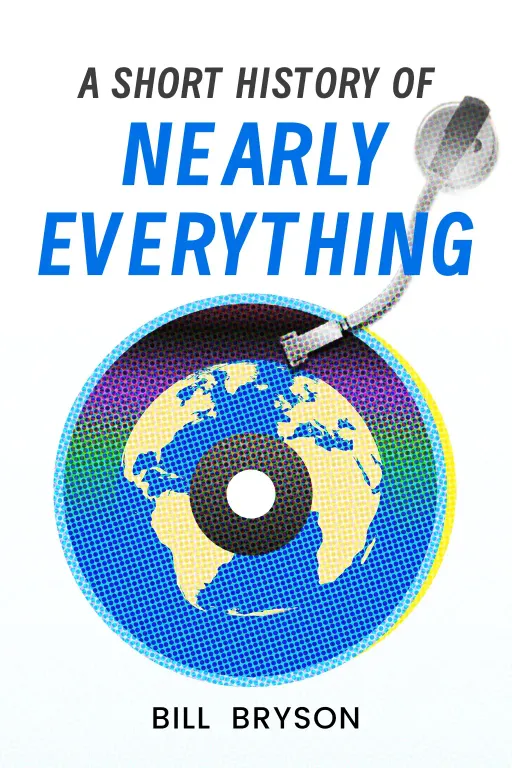
A Short History of Nearly Everything
Science
Bill Bryson
A Compendium of Existence: Summary and Analysis of "A Short History of Nearly Everything"
Bill Bryson's "A Short History of Nearly Everything" embarks on an ambitious intellectual odyssey, masterfully synthesizing an expansive array of scientific disciplines to illuminate the evolution of the universe, the Earth, and life itself. Employing an accessible yet sophisticated narrative style, Bryson navigates the intricate complexities of cosmological origins, geological transformations, and biological diversifications, offering readers a profound appreciation for the delicate interconnectedness of existence and the profound responsibility humanity bears as a steward of this precarious planet.
From Cosmic Dust to Consciousness: An Overview
The book commences with a rigorous examination of the Big Bang theory, tracing the nascent moments of the universe from an infinitesimally small singularity to its current, vast expanse. Bryson elucidates the fundamental forces and particles that emerged in the immediate aftermath of this cataclysmic event, laying the groundwork for understanding the subsequent formation of stars, galaxies, and planetary systems, including our own solar system. Concurrently, he introduces pivotal figures in scientific history, whose relentless pursuit of knowledge propelled our understanding of the cosmos forward, often amidst fierce intellectual disputes and societal skepticism.
Bryson transitions seamlessly into a detailed exploration of Earth's geological history, unraveling the processes that have shaped the planet's landscape, climate, and ultimately, its capacity to support life. He eloquently describes the tectonic forces that sculpt continents, the volcanic eruptions that reshape terrain, and the cyclical ice ages that have dramatically altered ecosystems over millennia. In this section, the concept of plate tectonics is not merely presented as scientific fact but as a testament to the dynamic, ever-evolving nature of our planet, perpetually engaged in a grand, geological ballet.
The narrative then organically pivots to the genesis and evolution of life, delving into the extraordinary transition from simple microbial organisms to complex multicellular beings. Bryson meticulously explores the origins of DNA, the role of proteins, and the emergence of cellular structures, illuminating the incredible improbability and miraculous serendipity that underpinned life's inception. Furthermore, he addresses the profound impact of extinction events, highlighting their role as catalysts for evolutionary innovation and the inherent resilience of life in the face of catastrophic change.
Finally, Bryson dedicates significant attention to the evolution of hominids, chronicling the gradual emergence of Homo sapiens from our primate ancestors. He examines the fossil evidence, the development of tool use, and the cognitive advancements that set our species apart, underscoring the environmental pressures and adaptive strategies that shaped our unique trajectory. The book culminates with a somber reflection on the impact of human activity on the planet, emphasizing the unprecedented rate of species extinction and the urgent need for environmental stewardship.
The Elegant Dance of Atoms: Philosophical Underpinnings
A core theme reverberating throughout "A Short History of Nearly Everything" is the recognition of the extraordinary improbability of existence. Bryson compellingly argues that the universe, Earth, and life itself are products of a series of incredibly improbable events, each contingent upon a delicate balance of physical laws and environmental conditions. This perspective invites a profound sense of awe and appreciation for the sheer miracle of our being.
Bryson masterfully illustrates how seemingly insignificant variations in fundamental constants or environmental parameters could have rendered the universe entirely inhospitable to life. The fine-tuning of the cosmos, the unique properties of water, and the precise positioning of Earth within the solar system are all presented as remarkable instances of cosmic serendipity.
Moreover, Bryson underscores the transient nature of existence, highlighting the cyclical pattern of creation and destruction that characterizes both geological and biological history. The rise and fall of species, the shifting of continents, and the ebb and flow of ice ages all serve as reminders of the impermanence of our current reality. This perspective prompts a sense of urgency in our quest for knowledge and a heightened awareness of our responsibility to future generations.
Humanity's Precarious Position: Ethical Imperatives
"A Short History of Nearly Everything" is not simply a compendium of scientific facts; it is a profound meditation on the human condition and our ethical obligations as inhabitants of this planet. Bryson explicitly addresses the devastating impact of human activity on the environment, particularly the accelerating rate of species extinction and the looming threat of climate change.
He highlights the tragic ironies of our history, where scientific advancements and technological progress have often been accompanied by environmental degradation and the exploitation of natural resources. The stories of extinct species, driven to oblivion by human actions, serve as cautionary tales, urging us to reconsider our relationship with the natural world.
Ultimately, Bryson's book presents a compelling case for environmental stewardship based not merely on scientific data but on a profound sense of moral responsibility. He suggests that recognizing our interconnectedness with all living things and acknowledging the fragility of our planet should motivate us to embrace sustainable practices and prioritize the preservation of biodiversity for future generations.
Conclusion: A Symphony of Science and Stewardship
"A Short History of Nearly Everything" offers readers a captivating exploration of existence, seamlessly integrating scientific knowledge with philosophical reflection and ethical considerations. Bryson's masterful narrative style transforms complex scientific concepts into accessible and engaging stories, fostering a deep appreciation for the interconnectedness of the universe and the extraordinary improbability of life.
More importantly, the book serves as a potent call to action, urging humanity to recognize its responsibility as stewards of this fragile planet. By illuminating the delicate balance of ecosystems and the devastating consequences of human activity, Bryson compels readers to embrace environmental stewardship as a moral imperative, ensuring the preservation of biodiversity and the sustainability of life for future generations. "A Short History of Nearly Everything" is, therefore, not only a testament to the power of scientific inquiry but also a profound plea for a more conscientious relationship between humanity and the natural world.










